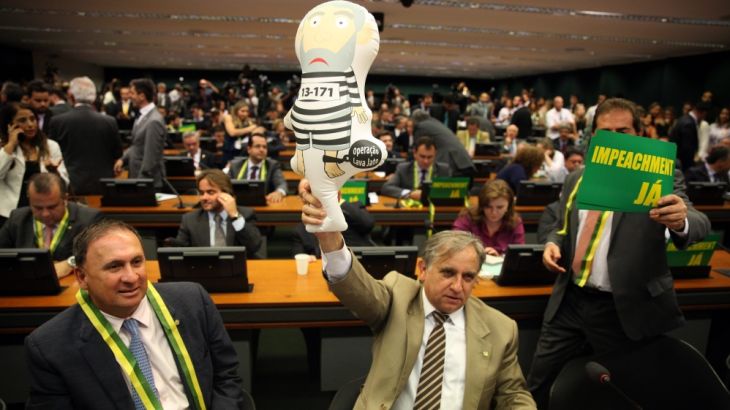Brazil tense as MPs begin impeachment debate
Street protests planned amid parliamentary proceedings that could topple President Dilma Rousseff on corruption charges.

Rival members of the Brazilian parliament are taking part in a controversial impeachment debate that could topple President Dilma Rousseff on charges of breaking budget laws.
Rousseff is fighting to survive a political storm prompted by Brazil’s worst recession since the Great Depression in the 1930s and a corruption scandal that has reached her inner circle.
Keep reading
list of 4 itemsRussia arrests deputy defence minister suspected of taking bribes
Ukraine’s agriculture minister suspected of corrupt land grab
Slapped: Speaking Up In Thailand
She is accused of manipulating budget accounts during re-election in 2014.
The sessions, which will go on until Sunday, will lead to a vote that could take Rousseff, 68, closer to being driven from office.
The development comes as Brazil, Latin America’s biggest economy, struggles through a recession.
INSIDE STORY: Will Brazil’s Dilma Rousseff be impeached?
The government’s lawyer, Jose Eduardo Cardozo, drew complaints in the chamber when he repeated Rousseff’s claim that the impeachment drive was a “coup”.
Brazil faces a tense weekend as the debates continue and rival protesters plan to take to the streets.
Rousseff’s supporters have been gathering for days at a stadium in the capital Brasilia. She had been expected to visit them on Saturday but cancelled her appearance.
Pro- and anti-Rousseff rallies are also planned in other cities on Sunday, including the economic capital Sao Paulo and Rio de Janeiro, where the Olympics will run from August 5-21.
![The Supreme Court, in a majority ruling, rejected Rousseff's attempt to have the impeachment move suspended [EPA]](/wp-content/uploads/2016/04/f9224144efdb44b6a7779edf4c9b39f2_18.jpeg)
Police tightly guarded the area around Brazilian Congress, which was surrounded by metal barriers.
Late on Thursday, the Supreme Court rejected Rousseff’s last-minute bid to have the impeachment proceedings suspended.
She alleged that the case against her was a vendetta marred by irregularities.
She also pulled out of a planned television appearance on Friday after opponents threatened to appeal against it in court.
Rousseff is accused of illegally manipulating government accounts. The accusations and a deep recession have dragged down her popularity.
If the lower house votes to push on with impeachment, Rousseff will be sent to trial in the Senate in a process expected to last months.
Polarised country
Latest counts of voting intentions in the lower house by Brazilian newspapers suggest the pro-impeachment camp have the two-thirds majority needed to pass the impeachment motion up to the Senate.
Rousseff accused her vice president, Michel Temer, and the house speaker of “treachery” and coup-plotting.
She also pledged to “fight until the last minute … to foil this coup attempt”.
But the collapse of her coalition has been relentless, starting with the defection of Temer’s Brazilian Democratic Movement Party (PMDB).
READ MORE: Poetry and poverty on the margins of Brazil
Temer will take over as interim president if the trial starts in the Senate. Rousseff would have to step down for six months during the proceedings.
If the Senate then voted by a two-thirds majority to impeach her, she would have to resign and Temer would remain in the presidency.
“Both the vice president and the president of the lower house who will guide the impeachment vote have been embroiled in corruption scandals,” Mark Langevin, an adjunct professor at George Washington University, told Al Jazeera.
He said what is going on in Brazil is deputies and power-brokers debating whether impeachment or the status quo is more divisive for the politically polarised country.